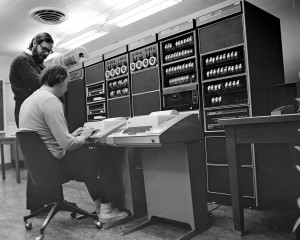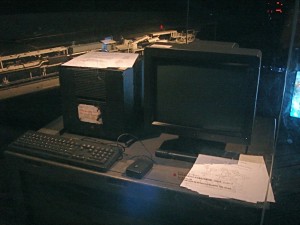Goodbyes and Hellos: Remembering Dennis Ritchie
If you’re reading this on an iMac, MacBook, iPod Touch, iPhone, or iPad, you can thank the late Steve Jobs. But your gratitude should also be extended to another technology giant who passed away last Saturday.
By J. R. Carroll.
Back in the early 1970s, Dennis Ritchie and a fellow engineer at Bell Labs, Ken Thompson, worked together on early versions of the Unix operating system. Up until this point, virtually all systems software had been written in assembly language, a low-level (literally, “move this byte of data from here to there”) interface to the actual machine language that made computer hardware do something useful. This meant that if you wanted to run the software on a different type of machine, it would have to be rewritten pretty much from scratch.
To get around this serious limitation, a machine-independent computer language (which would later be compiled into machine-specific language) was needed, but existing higher-level languages like Fortran—much less Cobol—really weren’t suited to the writing of systems software. So, largely in 1972, Dennis Ritchie devised the C programming language (which, in case you’re wondering, was the successor to an earlier B language), and he and Thompson used it the following year to develop the fourth edition of Unix. (Ritchie also used it to write what has become the standard, first program any beginning coder—in any language—comes up with, “Hello, world!”.)
So, why should you care about any of this? Well, that Apple device you’re looking at runs on the OS X operating system or its kid brother, iOS, and, underneath the familiar look and feel of Macs and iGadgets, OS X is a variant of Unix, based on the operating system for the NeXT workstations that Steve Jobs created during his years of exile from Apple. And the web servers that are delivering this page to you very likely are also running some flavor of Unix (or its open-source cousin, Linux) and web server software (probably Apache) written in C.
By general consensus, Steve Jobs revolutionized at least four industries, all of which have had significant impact on the arts: personal computing (the Macintosh), digital animation (Pixar), music distribution (the iTunes store), and mobile telephony (the iPhone). Many of these innovations would have been difficult, if not impossible, to achieve without the technological foundation created by Dennis Ritchie and his colleagues.
Twenty-five years ago, I wrote my first program in C; I compiled and ran it on a Unix server. Digging back into my dog-eared copy of The C Programming Language, I leave you with a variation of Ritchie’s classic code:
main()
{
printf(“Goodbye, Dennis. Thanks for making it all possible.\n”);
printf(“Goodbye, Steve. Thanks for making it all usable.\n”);
}
Tagged: Dennis Ritchie, iMac, iPad, iPhone, Ipod touch, MacBook, Steve Jobs


